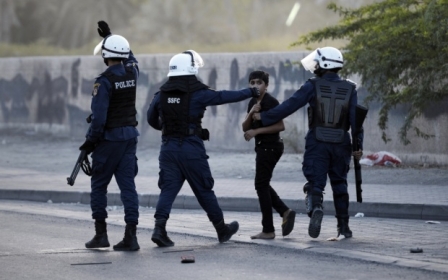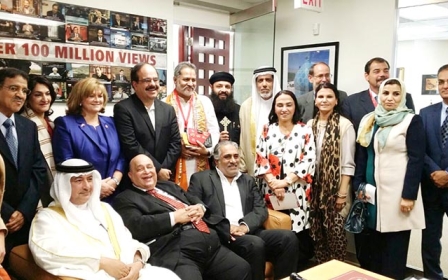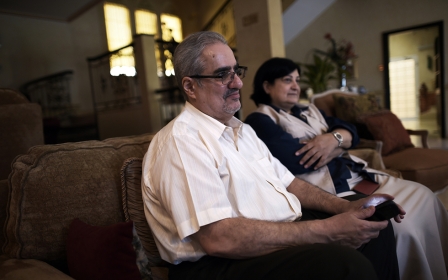REVIEW: Britain and Bahrain: Liberals and authoritarians hand in hand

Following UK Chancellor George Osborne’s visit to China last month in search of investment, particularly for the British energy sector, the Guardian’s political columnist Rafael Behr wrote to express some disquiet. By reaching out to an authoritarian government and offering it a significant strategic stake in our economy, according to Behr, Osborne was diverting the story of British liberalism into new and “uncharted waters”. This was a puzzling suggestion to say the least.
In reality, London has long cultivated alliances more strategically important and more morally compromised than that now being developed with China. The most obvious examples are those with Saudi Arabia and the Gulf states, who at various times have helped prop up the pound, ploughed their oil riches into the UK economy, and virtually bankrolled the British military industry with enormous arms purchases (to say nothing of their role in the supply of energy). One of the many commendable attributes of Bahrain’s Uprisings, an excellent new book edited by Ala’a Shehabi and Marc Owen Jones, is its examination of Britain’s alliance with one of these Gulf monarchies, and how London has helped to shield it from popular calls for democracy and civil rights.
During the tumultuous days of early 2011, Bahraini protestors poured onto the streets in vast numbers, only to be violently suppressed by the regime with the aid of a Saudi-led intervention force. Since then, the government in Manama has battled to keep a lid on dissent and maintain the status quo, while Britain has acted as its supportive adviser (and arms dealer) as well as a protective apologist on the international stage. Shehabi and Jones have brought together an impressively varied cast of dissidents, journalists, scholars and witnesses, from Bahrain and elsewhere, to cover the country’s situation and predicament from a range of important angles. The result is a book that will appeal to any journalists, scholars and members of the public interested in recent events under the rule of what Gulf expert Toby Jones describes as “one of the region’s most tyrannical states”.
Perhaps the book’s most striking chapter is a speech given to Bahrain’s appeal court by Ibrahim Sharif, a leading figure in the Bahraini opposition, a year after his arrest during the 2011 crackdown. Sharif pours scorn on the charge that he had plotted to install an Iranian-style theocracy, given the fact that he is both a Sunni and a renowned secular liberal, and extols the virtues of Gandhian non-violence both as a matter of principle and of strategic practicality. The reader’s wonder at the bravery required to express defiance in such strong and eloquent terms, even while completely at the mercy of the regime, is only enhanced by the details of his torture and sexual assault whilst in custody, included almost incidentally in a footnote. Together with the following chapter’s lyrical, personal account of life as a political prisoner from the Bahraini poet and writer Ali Al Jallawi, these testimonies deserve to take their place alongside those of figures such as Nelson Mandela in the historical record of extraordinary acts of personal courage in the name of freedom.
A different, but in its own way equally compelling perspective comes from Tony Mitchell, an Australian who had been working in Bahrain as an English teacher, and become an “accidental witness” to the abortive uprising. Mitchell, one of many thousands of ordinary Westerners attracted to temporary work in the Gulf, found himself documenting with a mixture of curiosity and mounting horror the regime’s crushing of demonstrations that had begun with what he describes as a “pleasant, carnival-like atmosphere”. He describes first-hand the shooting of protestors (including one man shot in the back while running away from the police) and his subsequent expulsion from the country after filming some of the events and posting a few critical comments on social media. It is a reminder to Western expatriates working in the Gulf of what lies underneath the glossy, modern veneer of these societies, and of just how thin that veneer really is.
The 2011 challenge to monarchical rule was dramatic, but far from unprecedented. Luke Bhatia and Ala’a Shehabi chart Bahrain’s long history of non-sectarian, pro-democracy activism, and the regime’s steadfast, often violent resistance to those demands, usually with the connivance of its British allies. Particularly relevant for British readers are chapters by Zoe Holman and Marc Owen Jones, both scholars of Britain’s links with the regime in Bahrain and its role in the repression there. Holman examines the sophistry and obfuscation employed by British ministers to justify their support for the regime over the last few years, while Jones critiques the current British line that Bahraini security practices are simply in need of “reform”, showing how abuses are intrinsic to the entire system that the British themselves originally set up, and are still battling to preserve.
One notable omission from the book is any detailed discussion of the plight of low-paid foreign migrant workers, who make up around half of Bahrain’s population. In fairness, Jones and Shehabi are conscious of this, justifiably noting that no single book can cover all angles of a topic, and pointing to forthcoming work devoted to the subject by Adam Hanieh. Nevertheless, the use of a massive, insecure migrant workforce is a key aspect of the Gulf monarchies’ strategy for retaining their power and privileges, and any book that sets out to critically analyse these regimes and their prospects for survival needs a chapter, or at least a section of a chapter, specifically on this topic. But this is one criticism of what is, overall, an exceptionally rich and impressive contribution on an issue that hasn’t received anything close to the attention it deserves.
A few days after lamenting the lack of “debate or challenge” to Osborne’s China policy, Rafael Behr criticised the new British Labour Party leader Jeremy Corbyn for bringing up UK ties with Saudi Arabia in a keynote speech. For Behr, Corbyn’s “morally admirable” stance was “politically very, very peculiar [and] not what the country wanted to hear from the leader of the Labour Party”. One suspects that if another candidate had won the Labour leadership election, and then echoed Behr’s concerns about China, the verdict would have been rather different.
If British liberalism is ever to rise to the level of something other than a hollow joke, it will need to confront the fact that a core component of Whitehall’s foreign policy has long been, and continues to be, the buttressing of despotism abroad. It will need, for example, to show as much concern about the war crimes the UK is actively helping its Gulf allies commit in Yemen as it does about those of its opponents in Syria. For those, such as Corbyn and his supporters, who are prepared to step out of line and insist that Britain takes its purported liberal values seriously, Shehabi and Jones have produced a book which will stand as an invaluable resource, and indeed as a source of inspiration, for many years to come.
Bahrain’s Uprisings: Resistance and Repression in the Gulf, edited by Ala’a Shehabi and Marc Owen Jones, was published by Zed Books on 15 September 2015. (ISBN: 9781783604340) Price: £18.99 (paperback)
Amazon link http://www.amazon.co.uk/Bahrains-Uprising-Resistance-Repression-Gulf/dp/1783604336
New MEE newsletter: Jerusalem Dispatch
Sign up to get the latest insights and analysis on Israel-Palestine, alongside Turkey Unpacked and other MEE newsletters
Middle East Eye delivers independent and unrivalled coverage and analysis of the Middle East, North Africa and beyond. To learn more about republishing this content and the associated fees, please fill out this form. More about MEE can be found here.




